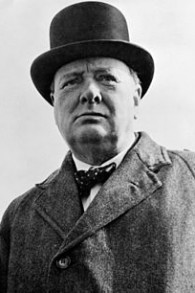
Winston Churchill is said to have been the first statesman to call for a united Europe. In 1946, he revealed a recipe for a “free” and “happy” European continent — “to re-create the European family… and to provide it with a structure under which it can dwell in peace, in safety and in freedom,” the victorious World War II prime minister said. “We must build a kind of United States of Europe.”
On Friday morning, Churchill’s dream, which until just a few years ago looked like it was becoming a reality, was smashed to pieces on the rocks of British public opinion, as 51.9 percent voted to leave the European Union, 43 years after the UK joined.
Churchill was a visionary of a united Europe, but he also recognized that making decisions based on what the majority of citizens feel can occasionally be problematic. “Democracy is the worst form of government, except for all those other forms that have been tried from time to time,” he said in a 1947 speech to the House of Commons.
 The premise of Churchill’s quip can be debated, but let’s face it, the year 2016, which saw Republican primary voters in the US defying all expectations — and their own party leaders — by crowning an inexperienced populist as their presidential candidate, and in which the citizens of an island nation decided to turn their back on a united Europe against the better judgement of most economists and the prime minister they themselves elected merely 13 months ago, was not a good year for direct democracy.
The premise of Churchill’s quip can be debated, but let’s face it, the year 2016, which saw Republican primary voters in the US defying all expectations — and their own party leaders — by crowning an inexperienced populist as their presidential candidate, and in which the citizens of an island nation decided to turn their back on a united Europe against the better judgement of most economists and the prime minister they themselves elected merely 13 months ago, was not a good year for direct democracy.
What does the so-called Brexit mean for Israel? Officials in Jerusalem remained silent on Friday, with the exception of Public Security Minister Gilad Erdan. While not commenting on the UK’s vote to leave the EU, he expressed regret over Prime Minister David Cameron’s decision to resign. (Cameron had been a strong, unheeded advocate of the “Remain” campaign.) At this point it is unclear how exactly Britain’s exit from the EU will play out even in Europe. Far-right politicians in France and the Netherlands have called for similar referendums, and Scotland is widely expected to launch another attempt at independence, after a failed referendum in 2014.
Given this widespread uncertainty, it is hard to foresee precisely what implications Brexit will have for the Jewish state. But, said Professor Sharon Pardo, big changes are now unfolding, and they will have an impact on Israel.
“Above all, we should remember that the EU is Israel’s largest trade partner. Every obstacle in the European integration project will have financial implications that will immediately influence the Israeli economy,” said Pardo, the director of the Center for European Politics and Society at Ben Gurion University of the Negev.
“When the EU is sick, Israel will suffer [too], it’s as simple as that,” he said.
On Friday, global stock markets crashed and in the short term, the Israeli economy will likely take a hit as well, Pardo predicted. “Israel is a member of the international community, and any major and drastic decision has implication on us as well.”
Diplomatically speaking, Israel is losing a friend in the union, but it is no catastrophe. London was not an ardent critic like Ireland or Sweden, but also not as friendly as Germany or the Czech Republic.
David Cameron, a Conservative, has been a staunch ally of Prime Minister Benjamin Netanyahu, while the current head of the Labour party, Jeremy Corbyn, is a harsh critic of Israel and has called Israel’s arch-foes Hamas and Hezbollah “our friends.” Several of his party members have resigned or been sacked amid an ongoing anti-Semitism controversy in the party.
If the results of Thursday’s referendum lead to new elections and help Labour come into power, UK-Israel relations can be expected to take a severe hit. But Corbyn is himself now also under pressure, as a backer of the failed Remain campaign.
On Friday morning, as much of the world was still reeling from the shock of what might have been the beginning of the end of a united Europe — which experts say is liable to cause a resurge in nationalism and racism — one Israeli group was gloating.
Regavim, a right-wing, pro-settlements “legal advocacy organization,”had campaigned for Brexit in order to punish the union for perceived anti-Israel policies.
“Regavim would like to thank all of our supporters who took a stand for the independence of Britain and Israel,” the group said in a statement issued minutes after the referendum’s results were announced. “The European Union should immediately stop its illegal building on Israeli land, stop funding anti-Israel NGOs and allowing European taxpayers’ money to bankroll Palestinian terrorists. Above all, it is time that the EU focus on its own problems and cease its unhealthy anti-Semitic obsession with Israel.”
This wish is as childish as it is unrealistic. Even after the UK formally leaves the union, which might take two or even three years, the 27 remaining member states are unlikely to change their positions vis-a-vis Israel and the Palestinian question.
Brexit will undeniably rock the EU, but the union has always managed to overcome crises and challenges, Pardo said. “Personally, I believe that the EU will emerge stronger than it was before,” he added.
Churchill would probably agree. “For myself I am an optimist — it does not seem to be much use to be anything else,” he once said.
- This article originally appeared on Times of Israel



